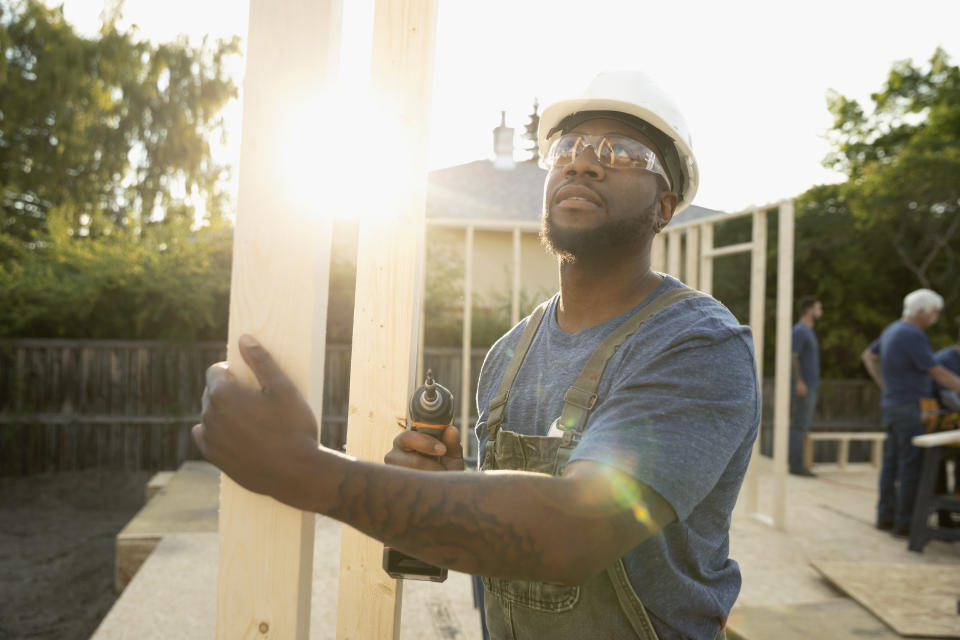What to expect from the housing market in 2020
With low mortgage rates and a limited number of available homes for sale, the 2019 housing market brought both hope and frustration to prospective homebuyers. The good news is, next year is looking up for the housing market.
Even as the economy slows, the housing market is expected to outperform other sectors. Mortgage rates are expected to stay low, while inventory shortages and price hikes should ease. These factors will make home purchases more accessible to young buyers, experts say. But they warn that the presidential election, trade negotiations with China, and global events like Brexit could change things for the U.S. housing market.
In 2019, mortgage rates dipped to 3.5% — historic lows — stimulating the housing market. The low rates encouraged people, who were on the fence, to buy and some homeowners to refinance.
“Mortgage rates will stay down late through the end of next year. Low rates are the linchpin of the housing market and are keeping homeownership within reach,” said Ali Wolf, director of economic research at Meyers Research LLC, a Beverly Hills-based real estate information company.
Economists expect low rates because inflation is below the Federal Reserve target, the U.S-China trade war continues to influence lower Treasury yields, consumer spending is slowing, and the Fed foresees slower growth ahead, according to Mark Boud, senior vice president and chief economist at Washington, D.C.-based home data platform Metrostudy in a housing outlook presentation.
“Mortgage rates are at historic lows, and as long as they remain that way, it’s a major factor in the ability to buy a home,” said Steven Schnall, chief executive officer of Manhattan-based Quontic Bank.

Some inventory relief
The low rates pushed buyers, who would have normally sat on the sidelines, to jump into the market this year and as a result exacerbated already low inventory levels, especially for starter homes, and drove home prices up this year. Experts predict the supply and demand gap should slightly narrow in 2020. Building permits, which predict future construction, rose 5% to 1.46 million in October, the fastest rate since May 2007. The National Realtors Association (NAR) expects housing starts, also a leading indicator of the market, to increase 11.5% in 2020 from this year.
“Any time there’s a shortage, labor will respond to those shortages,” said Lawrence Yun, NAR’s chief economist, adding that the industry would overcome a tight labor market and slow pace of job creation with aggressive recruitment and high-paying salaries. An anticipated trade deal, which would bring down the cost of construction supplies, and competitive recruitment from the construction industry, are also expected to help developers speed up construction.
Despite some relief, demand is expected to continue to outpace supply until 2024, said Boud. Total housing inventory at the end of October was 1.77 million units, down 4.3% from one year ago, according to the NAR.
“Buyers should continue to expect a headache. They’re going to run into low inventory, facing other buyers and budding wars,” said Wolf.
While economists expect home prices to continue to increase in 2020, the pace of growth will continue to slow. “We’ve hit a price ceiling... Most markets reached or exceeded their previous [pre-recession] peak,” said Wolf.
That news is a relief. In 2019, affordability was the chief issue preventing homeownership as monthly mortgage payments continue to outpace wage growth.
“With the Fed lowering rates, it means there is a lot more access to affordable capital. But it also means more people are qualifying and putting money down,” said Indraneel Karlekar, senior managing director and global head of research and strategy at Principal Real Estate Investors, a Des Moines-based investment firm that manages $85 billion in real estate assets.

The year of the millennial homebuyer
For the first time, millennials surpassed other demographics, representing 36% of homebuyers, in 2019, according to the NAR. Their entrance into the market is expected to boost first-time home sales faster than any three-year period since the Great Recession, a recent Transunion study said.
“Millennials have been pondering and assessing homeownership for years, and now that the market feels a bit more balanced, they're ready to jump in,” said Wolf.
The shift to young buyers has caused investors to ponder the best way to attract millennials. Trendy locations, proptech (property technology), and green initiatives are on many developers’ agendas. Research also shows the rise of Do-It-Yourself and renovation TV shows is influencing millennials and Generation Z.
“We are seeing an ongoing strong desire for personalization, that is particularly important to millennials and Gen Zers who are entering the homebuying market,” said Jeff Mezger, president and chief executive officer of KB Home. “This group is more focused on personalization in their everyday lives, and it is resonating in the homebuying process as well. They not only want to choose the communities they live in, but want to select their own floor plans, personalized textures, colors and design features.”
Others are predicting a rise in the importance of environmental sustainability, not a bad guess, since millennials are known for caring about a brand’s social image.
“The world’s increasing interest in environmentally and socially conscious business practices will stimulate the real estate industry to design properties in a greener way,” said Louis Adler, Principal and Co-Founder of REAL New York, a New York City-based real estate brokerage.
But ultimately millennials say it really all comes down to price.
“The main issue is the ability of a millennial to afford to own a house. In most markets, it is too expensive to own,” said Michael Romer, co-founder and managing partner of Manhattan-based law firm Romer Debbas, LLP.

Housing market threats
Economists agree that if a recession were to hit the U.S., the housing market will remain intact. The next recession will not dramatically lead to a housing crash like in 2008, according to Boud.
“I can’t stress enough that this particular recession that we’re forecasting isn’t going to be a housing-led recession,” said Boud. “And in fact just the opposite. Housing will actually fare pretty well.”
The sector’s safety comes from responsible lending standards due to increased regulation after the 2008 housing crisis, according to Jason Hernandez, managing director and head of originations, debt at Nuveen.
“We don’t see imbalances and risks like we did last time, so I don’t expect to see a downturn as dramatically as the Great Recession,” said Dan North, chief economist at Paris-based insurance company Euler Hermes.
The ongoing U.S.-China trade war and the 2020 presidential election will likely have more of an impact on the housing market next year. The president in office from 2021 to 2025 could drastically change the market with lending regulations and higher taxes.
“In each election cycle, especially the presidential election, there is only hesitation and trepidation in the market,” said Romer. “Money will be sitting on the sidelines until there is some clarity of who is manning the ship.”
If President Trump remains in office, mortgage rates are expected to stay low, and if a Democrat takes office, regulations and taxes could increase, stalling growth, said Jarred Kessler, chief executive officer of EasyKnock, a New York City-based home equity proptech startup.
“Today, we are seeing drastic differences between candidates. There is a larger divide in the country than there was in my generation. So it impacts the housing market even more now than it did before,” said Pierre Debbas, co-founder and managing partner of Romer Debbas, LLP. “Trump, Biden, and Sanders are all so completely different, that it will have a huge impact on the market.”
Trade relations with China heavily influence building costs as well as consumers’ willingness to make big purchases. Economists also caution that turbulence over Brexit could impact the U.S. economy, and by extension the housing market.
“There are catalysts to change that [U.S. housing growth]. If things with China do not go well... or globally, if Brexit goes badly, we are all interconnected,” said Karlekar.
Sarah Paynter is a reporter at Yahoo Finance. Follow her on Twitter @sarahapaynter
Read the latest financial and business news from Yahoo Finance
Follow Yahoo Finance on Twitter, Facebook, Instagram, Flipboard, SmartNews, LinkedIn, YouTube, and reddit.
More from Sarah:
Low mortgage rates are fueling a housing shortage
The cities most at risk of a real estate bubble: UBS
Generation Z actually prefers to buy homes instead of rent: Freddie Mac survey

 Yahoo Finance
Yahoo Finance 
